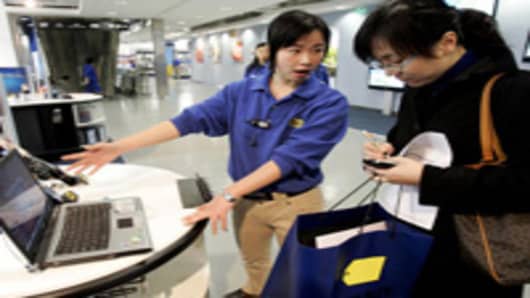China's retail sales grew by 20.2 percent in January and February from a year earlier, supported by strong consumer spending but also propped up by the highest inflation in nearly 12 years.
The reading, which matched the December figure, exceeded economists' forecasts of a 20.0 percent rise. The pace of 20.2 percent is the fastest since the government started gathering monthly data in 1999.
Economists noted that because retail sales figures are nominal, they are being boosted by rising consumer inflation, which hit a nearly 12-year high of 8.7 percent in February.
"Stripping out inflation, the overall volume of retail sales has been growing in a steady manner in the past few months, at about 12-13 percent," said Gene Ma, chief economist at China Economic and Business Monitor in Beijing.
The National Bureau of Statistics said on Wednesday that sales of grain and edible oil were up 41.2 percent in the first two months from a year earlier. By comparison, food oil prices were up an annual 41 percent in February.
Still, Ma noted that sales of other items that are not largely behind the recent rise in the consumer price index were also strong, reflecting genuine consumer demand.
Sales of automobiles were up an annual 33.8 percent in January-February; prices for the broader category of vehicles actually dropped 3 percent from a year earlier in February.
Jewelry sales jumped 46.8 percent from a year earlier in the first two months, extending a trend of strong growth.
"Chinese peoples' investment income has been increasing rapidly in recent months. Well-off people then buy gold and jewelry to counter the impact of inflation, as well as to consume," Ma said.
Property and share prices have risen rapidly over the past two years, although the stock market has recently seen a slump.
China issues combined January-February figures for retail sales in order to smooth out the effects of the Lunar New Year, which falls at different times in these two months each year.
Dong Tao, an economist with Credit Suisse in Hong Kong, also noted the role of inflation in boosting the figures.
"But we do think that Chinese private consumption is taking off nicely," Tao said. "We argue that the Chinese export sector will see a structural decline, while Chinese private consumption will have quite a nice ride in the coming years because of improved confidence and rising incomes in the rural sector."
Separate figures from the Commerce Ministry suggested that foreign direct investment (FDI) would also continue to be a driver of growth.
It said that China drew in $18.13 billion in FDI in January and February, 75.2 percent more than a year earlier. Inflows in February alone hit $6.93 billion.


